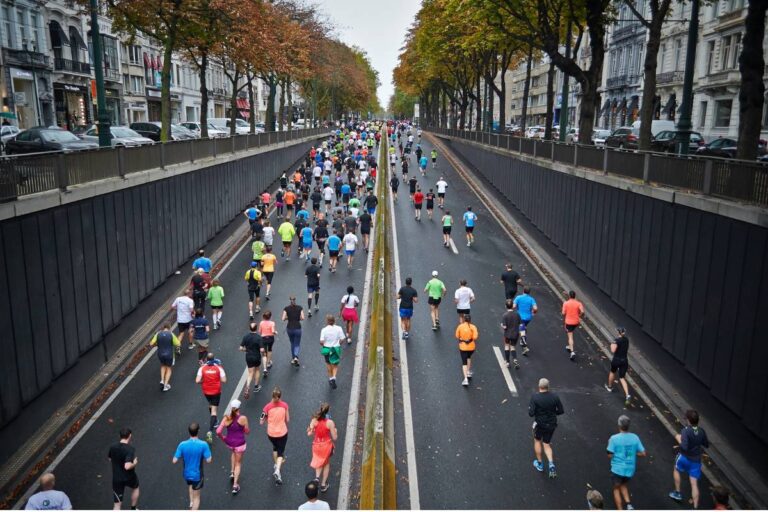Fueling for Running: How to Fuel and Why It’s Important
If you want to take your running to the next level and feel strong while doing so, make sure you’re fueling! Sports Dieititian and sub-3 hour marathoner, Meghann Featherstun, answers your frequently asked questions about fueling for running, why it’s important, and how to find what works best for you.
Fueling for Running – Meet the Sports Dietitian:
I’m Meghann, a sports dietitian, and lover of all things running!
Fueling for Running – On the Run:
Before the Run:
Should I eat before every run, even short and easy runs? Why? Yep! We need to fuel before all runs to keep our bodies healthy and resilient.
What should I eat before a run? An easily digestible carbohydrate. Some examples are:
- Toast
- Banana
- Graham crackers
- Waffle
What are some pre-long run / pre-race breakfast ideas? Practice WHAT works for you every day and then scale up the amount for long runs and races.
For example, if you eat 2 graham crackers before easy runs – scale this up to 6 graham crackers pre-long run.
During the Run – When to Fuel:
When should I start fueling for longer runs? The goal is to fuel early and often in our race. We want to practice this on long runs. For instance, take note of how you are doing now, and slowly scale up the amount of fuel you take to goal race day fueling. This can take some time and practice so it’s never too early to start practicing.
At what point during a long run or race should I take fuel or a gel? You should start fueling within the first 30 – 45 minutes of long runs and races.
What happens if I don’t fuel during a long run or race? If we are not taking in adequate carbohydrates during long runs and races, we burn through our stored carbohydrates. When those run out, we have to rely solely on fat for fuel. Fat is a slow fuel source and when we start using this, we ‘hit the wall’ and cannot maintain our paces.
During the Run – Types of Fuel:
What is the best fuel for running? There are many different types of fuel options for runners:
- Gels
- Chews
- Drinks
- Real food options (applesauce, pretzels, raisins, dates, apricots)
The best fuel for you is the one you will take enough of, can tolerate, and works for your running goals.
How do you fuel when running? I take a Maurten gel every 20 – 30 minutes & hydrate with Skratch Labs sport hydration.
What are the negatives of energy gels? Some people need to experiment with different gels to find the one that works best for them! But, no negatives when we find what works.
What are some fueling alternatives (that are easy to carry) for sensitive stomachs besides gels? In my experience, sensitive stomachs are from one of two issues. One – not training our gut to take fuel. We have to practice early and work up to race day fueling. Two – dehydration. When we are dehydrated, we will not tolerate fuel.
How do I stop getting the urge to pass a bowel movement on my runs? Find a routine to go before you run. Stay hydrated. Practice fueling. Watch fiber in your diet around big runs.
After the Run:
How much and how soon should I eat after a run? We want to nail our protein needs + some carbohydrates asap!
Looking for easy and delicious recipes to fuel your running, family, and life? Grab Meghann’s “Fuel It Up” E-Cookbook here!
Any tips for dealing with nausea after a long run? This can be related to exertion or dehydration. If it’s dehydration, have a salty snack – like pretzels. This should settle your stomach and increase thirst to encourage you to drink water or an electrolyte drink.
What are some post-run snack and meal ideas? Shower shakes!!!! Grab that recovery protein and drink it as you hop in the shower! Then, have a meal when you can sit down 1 – 2 hours later.
Fueling for Running – Hydration:
During a long run or race, how much water / electrolytes should I be drinking and how often should I have them? This all depends on sweat rate, which is highly genetic and weather dependent.
Always carry fluids during long runs! Use a Handheld Running Water Bottle for shorter runs and a Hydration Running Vest for long runs.
Should I drink electrolytes everyday? This depends on the weather and your sweat rate. We can replace fluids lost via water and sodium in food. But some people find it easier to drink an electrolyte drink.
Nuun Sport Electrolyte Tablets are an easy way to get in extra electrolytes!
Out of my daily water intake, how many ounces should be electrolytes? What is the water to electrolyte ratio? There is not a ratio for this and it is dependant on each athletes hydration, sweat rate, and climate.
Any tips for keeping water in your pack cold? My ice cubes always melt. Nature of the beast! If it’s hot and we’re putting off a lot of heat, they will melt.
Is late race cramping a result of electrolyte depletion? It absolutely can be. Late race cramping can be related to dehydration and sodium loss.
Fueling for Running – Race Week:
How do I carb load for a half marathon? Marathon? See my Carb Load page and Carb Load Guide on my website!
Should I drink more water and/or electrolytes before a race? Yes – when you are carb loading you need to drink about 30 oz more fluid per day. Glycogen is stored carbohydrates and water so this increases our fluid needs.
After a race, should I reduce how much I’m eating? We should eat to appetite post race for a few days as recovery takes a lot of energy. Then, as appetite decreases we can start to intentionally scale back carbohydrates as carbohydrates needs are directly related to activity levels.
Fueling for Running – Summer Training:
How do you approach fueling / water when the weather gets warmer? Know your sweat rate (will have resources on my site for this soon!) and stay on top of daily hydration. Have a plan for before, during and after run hydration and stick to it!
Read more about Running in the Heat and how to make it more enjoyable!
Interested in Working with Meghann?
Connect:
Learn more from Meghann on Instagram and her website, Featherstone Nutrition.
Nutrition Coaching:
5 Principles of Becoming a Stronger Runner:
Comment Below:
What do you like to eat before a run? After a run?


















